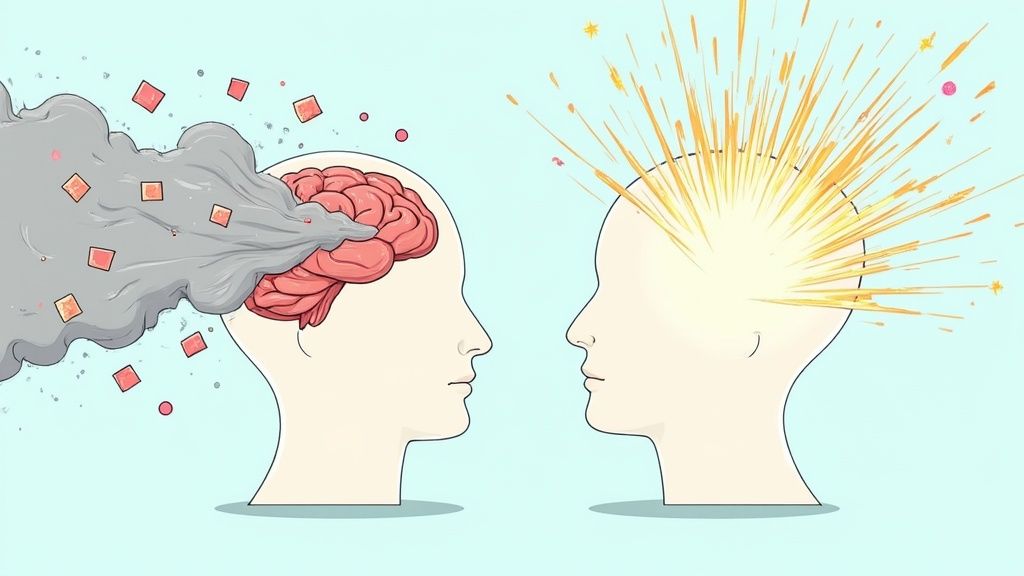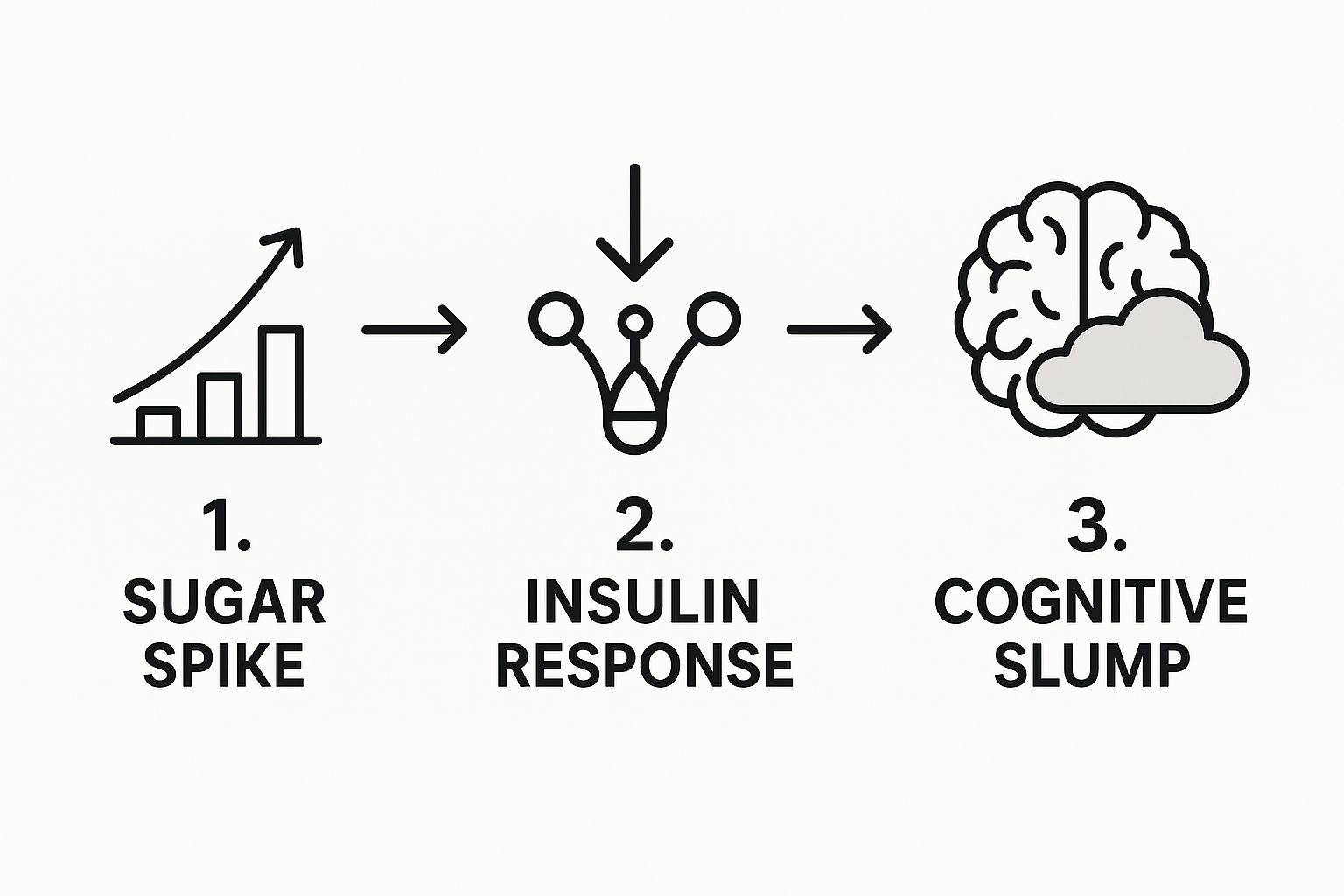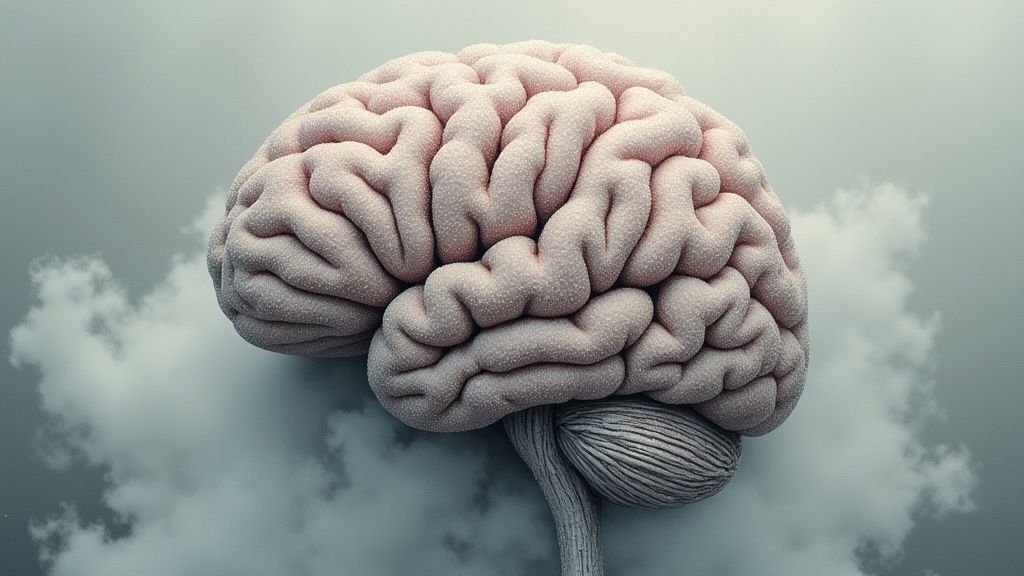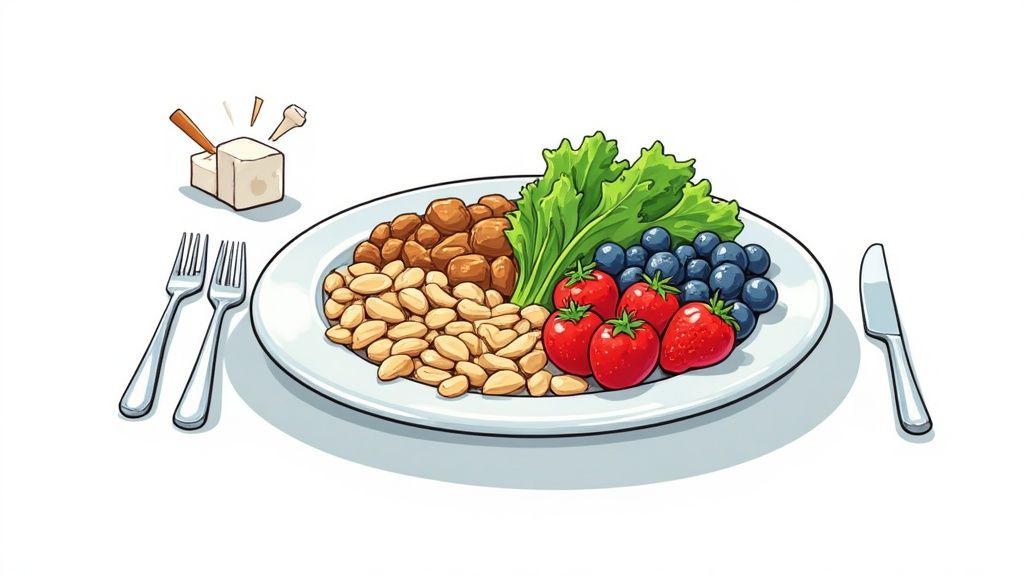Beat Brain Fog Sugar: Simple Tips to Regain Clarity

Ever felt like your brain just… shuts down after a sweet treat? That groggy, slow-thinking feeling isn't in your head—well, it is, but it's a real, physical response. The link between brain fog and sugar is all about the chaotic energy rollercoaster it sends your brain on.
Why Sugar Makes Your Brain Feel Foggy
Imagine your brain is a high-performance car. It runs best on a steady, premium fuel supply to keep it humming along smoothly. That fuel is glucose. But when you load up on sugary foods, it’s like dumping cheap, low-grade gas into the tank. You get a quick jolt, a burst of acceleration, and then... sputtering and stalling.
That's exactly what happens in your body. The moment you eat something sugary, your blood sugar soars, giving you a quick, fleeting burst of alertness. But your body sees this spike as an emergency and dispatches a flood of insulin to get all that excess sugar out of your bloodstream fast.
The problem is, this emergency response is often too powerful. The insulin rush yanks your blood sugar down, causing it to crash to levels even lower than before you had the snack. This is the "sugar crash," and it’s the exact moment the brain fog rolls in. Suddenly, your brain is starved of the consistent energy it desperately needs.
The result? You feel mentally drained. It becomes tough to focus, remember simple things, or just think clearly. This isn't a personality flaw; it's your brain's very real reaction to a wildly unstable fuel source.
This simple cycle—the spike and the crash—is a surefire recipe for a cognitive slump.

As you can see, that initial high is always followed by a low, dragging your mental clarity down with it.
The Science Behind the Slump
This blood sugar rollercoaster isn't just a temporary annoyance; it has a real impact on your brain's health. Your brain absolutely needs glucose, but it thrives on a slow, steady drip, not a firehose blast.
Think about it: your brain uses a massive 20% of all the energy your body derives from glucose. Yet, studies consistently show that bombarding it with sugar from processed foods and sweetened drinks actually hurts key functions like memory and attention. You can explore the research on sugar and cognitive function to see just how deep the connection goes.
To make this crystal clear, let's walk through what happens in the hour after you eat a sugary snack.
The Sugar Crash Cycle and Your Brain
This table breaks down the step-by-step process, connecting what’s happening inside your body to how you actually feel.
| Time After Eating Sugar | What Happens in Your Body | How You Feel (Brain Fog) |
|---|---|---|
| 0-15 Minutes | Sugar is rapidly absorbed, causing a sharp rise in blood glucose. | A temporary feeling of energy, alertness, and even euphoria. |
| 15-30 Minutes | The pancreas releases a large amount of insulin to manage the sugar spike. | You're at the peak of your "sugar high." Feeling good! |
| 30-60 Minutes | Insulin works overtime, pulling too much glucose from the blood. | Energy starts to dip. Focus begins to waver. |
| 60+ Minutes | Blood glucose levels have now crashed below baseline. | Brain fog sets in. You feel tired, irritable, and unfocused. |
This cycle explains perfectly why that 3 PM candy bar, which seems like a brilliant idea for a quick pick-me-up, leaves you feeling more exhausted and fuzzy an hour later. The brain fog from sugar is simply your brain's way of telling you that its fuel supply line is broken.
The Hidden Damage Sugar Causes to Your Brain

That immediate mental haze you feel after a sugary snack? It’s just the tip of the iceberg. Under the surface, a diet loaded with sugar can quietly inflict much deeper, more lasting damage on your brain. The link between brain fog and sugar is really a warning sign of serious biological stress.
To truly fix the problem, you need to understand what’s happening behind the scenes. When you eat too much sugar, you kick off a chain reaction of harmful processes that impact your brain’s structure and function. It’s not just about feeling a little tired; you’re actively wearing down your most vital organ. Let's dig into the three main ways this damage happens.
Chronic Inflammation: The Brain's Alarm System
Think of inflammation as your body's alarm system. It’s meant to go off when there’s a threat, like an injury or infection. But a high-sugar diet essentially keeps that alarm blaring all the time. This creates a state of chronic, low-grade inflammation that simmers throughout your body—and in your brain.
When your brain is inflamed, the communication between your nerve cells slows way down. It’s like trying to have a clear conversation in a room with a loud, non-stop siren. This constant state of emergency gets in the way of sharp thinking, contributing directly to that feeling of brain fog, memory trouble, and mental fatigue.
Oxidative Stress: The Brain's Cellular Rust
Another major problem caused by too much sugar is oxidative stress. The easiest way to picture this is as a kind of "cellular rust." Just like metal rusts and breaks down when exposed to the elements, your brain cells get damaged by unstable molecules known as free radicals.
A diet high in sugar dramatically ramps up the production of these free radicals. Over time, this cellular damage builds up, degrading the health of your neurons and messing with their ability to work properly.
Oxidative stress doesn't just cause temporary brain fog; it accelerates the aging process of the brain, making it more vulnerable to long-term cognitive decline. It's a slow, silent erosion of your mental hardware.
This "rusting" process weakens your brain's resilience, making it a lot harder to think clearly and efficiently.
Insulin Resistance: A Breakdown in Fuel Delivery
Finally, a constant barrage of sugar can lead to insulin resistance in the brain. Insulin acts like a key, unlocking your cells to let glucose in for energy. But when your brain cells are constantly bombarded with sugar, they can start to ignore insulin’s signal—almost like they’ve become "deaf" to it.
This resistance means your brain cells can't get the fuel they need, even if there’s plenty of glucose floating around. They are essentially being starved of their primary energy source. This energy crisis shows up as severe brain fog, poor concentration, and a feeling of being mentally drained all the time. It's a critical breakdown in your brain's most essential supply chain.
Long-Term Brain Health Risks from High Sugar Intake
That daily struggle with sugar-induced brain fog is more than just frustrating—it’s a bright red warning light for much more serious trouble down the road. The immediate mental slump you feel is really just a symptom of a deeper, long-term attack on your brain's health.
Think of it this way: a single high-sugar meal is like a small fender bender for your brain. Annoying, but you recover. A chronic high-sugar diet, however, is like getting into a major pile-up every single day. The damage starts to add up.
Over time, the very same things that cause that temporary brain fog—inflammation, oxidative stress, and insulin resistance—start to wear down the physical structure of your brain. This constant biological stress is strongly linked to accelerated cognitive decline. Your brain literally ages faster, making it harder to learn new things, process information, and hold onto sharp memories as you get older.
The Escalating Risk of Cognitive Impairment
The link between a high-sugar diet and cognitive decline isn't just a theory; it’s a growing public health concern. As sugar consumption has skyrocketed around the world, so have rates of cognitive issues.
For example, data from Malaysia revealed a scary trend. As the annual availability of sugar per person nearly doubled, the prevalence of cognitive impairment in people who ate a lot of sugar soared to 31.9%. This shows a direct line between the metabolic problems caused by excess sugar and a higher risk of serious brain health issues. You can read more about these cognitive risk findings to see the global data for yourself.
This pattern is alarming because it's so clear: the more sugar in our diets, the higher the odds of our brains letting us down later in life. We're not just talking about forgetting where you put your keys. This is about a significant erosion of your most vital mental functions.
A diet high in sugar essentially creates a hostile environment for your brain cells. This continuous stress not only impairs day-to-day function but also dramatically increases your vulnerability to serious neurodegenerative diseases, including Alzheimer's and other forms of dementia.
Making a change today is a powerful investment in preserving your mental sharpness for decades. Cutting down on sugar isn’t just about feeling more clear-headed tomorrow; it’s one of the most proactive steps you can take to protect your brain's future.
If you want to protect your long-term health, exploring the incredible benefits of a no-sugar diet can give you a clear roadmap. Your cognitive future really does start with the choices you make at your next meal.
How Sugar Impacts Your Mood and Mental Well-Being

The frustrating connection between brain fog and sugar isn't just about feeling slow or forgetful. It digs much deeper, right into your emotional core. Ever felt a wave of anxiety, irritability, or just plain lousy after indulging in something sweet? That’s not in your head. It's the very real, very powerful link between what you eat and how you feel.
This emotional swing isn’t just a fluke. It's the direct result of sugar messing with your brain's delicate chemical balance.
The Neurotransmitter Rollercoaster
Think of your brain as a busy control room. It uses chemical messengers called neurotransmitters to manage everything from your happiness levels to your drive to get things done. Sugar hijacks this system, sending two of the most important messengers—dopamine and serotonin—on a wild ride.
When you eat sugar, your brain releases a rush of dopamine, often called the "reward" chemical. It feels good. It’s a momentary high. But, much like the energy crash that follows a sugar binge, this dopamine spike is followed by a steep drop. Suddenly you're left feeling flat, uninspired, and wanting another sugary fix to feel good again.
This up-and-down cycle is a huge part of why kicking a sugar habit is so tough. Your brain quickly learns to associate sugar with pleasure, creating a powerful craving that pulls you back in, even when you know the crash is coming.
At the same time, sugar throws a wrench in your serotonin production. Serotonin is the neurotransmitter that keeps your mood stable and helps you feel content. A diet high in sugar can get in the way of your body's ability to manage serotonin, leading to those lingering feelings of sadness and anxiety.
The Link to Mood Disorders
This isn't just about a temporary bad mood. Over time, this emotional rollercoaster can make existing mental health struggles feel much worse. In fact, recent analyses have confirmed a major link between high sugar intake and the risk of depression. By fueling inflammation in the brain and disrupting neurotransmitters, sugar can create an internal environment where conditions like anxiety and depression feel more intense.
In the end, mental clarity and emotional stability go hand-in-hand. The very same things that cause brain fog from sugar are also responsible for throwing your mood off-kilter. Cutting back on sugar isn't just about thinking more clearly; it's a powerful way to find a calmer, more balanced emotional state. If you feel ready to take that first step, our guide on how to break sugar addiction lays out a practical path forward.
Practical Steps to Cut Sugar and Clear Your Mind
Knowing that sugar is the culprit behind your brain fog is a great first step, but what do you do about it? It’s one thing to understand the problem and another thing entirely to solve it. The good news is you don't have to turn your life upside down overnight.
Shaking off that brain fog sugar is all about making small, manageable changes that, over time, add up to a much clearer mind. Think of this as your personal action plan.
The journey doesn't start at your dinner table—it begins in the grocery store aisle. So many foods masquerading as "healthy" are secretly loaded with sugar, keeping you stuck in that frustrating fog. Learning to spot them is your first, and most important, mission.
Become a Food Label Detective
This is where you take your power back. You have to get comfortable reading the nutrition facts panel, and more importantly, the ingredients list. Sugar is a master of disguise, hiding under sneaky names like high-fructose corn syrup, dextrose, sucrose, maltose, and cane juice.
Here’s a simple rule of thumb: if sugar (or one of its aliases) is one of the first few ingredients, put it back. It’s almost certainly a sugar bomb. Be especially wary of these common culprits:
- Yogurts and Sauces: That vanilla yogurt or jar of pasta sauce? They are often packed with sugar. The same goes for most salad dressings.
- "Healthy" Cereals: Don't be fooled by the box. Many granola and breakfast cereals are swimming in added sugars.
- Packaged Breads: Even a loaf of whole wheat bread can have a surprising amount of sugar added to it.
Once you know what you're looking for, you can start building a pantry that actually supports your goal of mental clarity.
Build Your Brain-Friendly Pantry
When your kitchen is stocked with the right stuff, making good choices becomes almost effortless. The goal is to focus on whole, unprocessed foods that give your brain a steady, reliable source of energy.
Here are a few simple swaps to get you started:
- Drink Smarter: Ditch the sugary sodas, juices, and sweetened coffees. Instead, reach for water, herbal tea, or sparkling water with a squeeze of fresh lemon. Staying hydrated is a huge part of fighting fog.
- Snack on Whole Foods: Instead of a granola bar (which is often just a candy bar in disguise), grab a handful of nuts, an apple with peanut butter, or some plain, unsweetened Greek yogurt.
- Prioritize Protein and Fat: Making sure every meal has a good source of protein and healthy fats is a game-changer. It helps keep your blood sugar stable, preventing the energy crashes that bring on brain fog.
Of course, these changes can feel tough at first, especially when the cravings kick in. For those moments, learning how to stop sugar cravings naturally can give you the tools you need to stay on track without having to rely on sheer willpower.
Let Technology Give You a Hand
Making these changes is a lot easier when you have a little support. This is where a tool like the StopSugar app can really make a difference. It’s designed to guide you through the process, helping you keep track of your sugar intake and truly understand your habits.
The app gives you a simple way to log your progress each day and see how you’re feeling. It’s all about connecting the dots between your diet and your newfound mental clarity.
Here's a peek at how the app's mood tracker helps you connect the days you skip sugar with how good you feel.
This kind of visual feedback is incredibly powerful. It reinforces the positive changes you’re making and gives you the motivation to keep going.
By tracking both what you eat and how you feel, you create a powerful feedback loop. You can physically see the connection between your sugar-free days and your better moods, turning an abstract goal into tangible, daily proof that your hard work is paying off.
Foods That Fight Brain Fog and Boost Focus

Okay, so we’ve talked about what to cut out to clear the fog. But what should you be adding? This isn't about deprivation; it's about actively building a sharper, more resilient mind by giving it the right fuel.
Think of it like upgrading your brain's internal hardware. Certain foods provide the exact building blocks your brain needs to defend against inflammation and oxidative stress—the very problems that sugar loves to create.
The Power of Healthy Fats and Antioxidants
First on the list are omega-3 fatty acids. These aren't just "good fats"; they're fundamental components of your brain cell membranes. They are absolutely critical for smooth nerve cell function and long-term brain health, and they actively fight the inflammation that leads to that fuzzy, unfocused feeling.
Next up are antioxidants. If you imagine sugar causing a kind of "rust" on your brain cells through oxidative stress, then antioxidants are the rust-proof coating. They go to work neutralizing the free radicals that damage brain cells, keeping your mind feeling sharp and efficient.
- Omega-3 Rich Foods: Fatty fish like salmon and mackerel are fantastic. For plant-based options, walnuts and flaxseeds are packed with them.
- Antioxidant Powerhouses: Think color! Berries (especially blueberries), dark chocolate, and leafy greens like spinach and kale are loaded with these protective compounds.
By focusing on these foods, you're doing more than just eating healthy. You're giving your brain the specific tools it needs to repair itself and maintain clear communication between neurons, directly fighting back against brain fog from sugar.
Fueling Up With Smart Carbs and Hydration
Not all carbs are the enemy—far from it. While sugary, simple carbs lead to that familiar crash-and-burn cycle, complex carbohydrates are your brain's best friend. Found in whole grains, legumes, and vegetables, they provide a slow, steady stream of energy. This keeps your blood sugar stable and gives your brain the consistent fuel it needs to stay focused all day long.
And of course, don't forget to hydrate! Proper hydration is one of the simplest yet most effective ways to maintain mental clarity.
Making a few smart food swaps can have a massive impact on how you feel. It doesn’t have to be complicated.
Food Swaps for a Clearer Mind
Here are a few simple substitutions you can make to reduce sugar and give your brain a serious boost.
| Instead of This (High Sugar) | Try This (Brain-Boosting) |
|---|---|
| Sugary cereal or a morning pastry | A bowl of oatmeal with walnuts and berries |
| A candy bar for an afternoon snack | A handful of almonds and an apple |
| White pasta with jarred sauce | Whole-wheat pasta with homemade pesto |
| Soda or sweetened iced tea | Sparkling water with a squeeze of lime |
Each of these simple changes replaces a source of brain fog with a food that actively fights it. It’s a powerful mental shift: instead of focusing on what you're giving up, you get to focus on all the clarity and energy you're gaining.
Got Questions About Sugar and Brain Fog? Let's Get Them Answered
Deciding to cut back on sugar is a big step, and it's totally normal to have a few lingering questions. Getting these sorted out can give you the confidence you need to really commit and finally get rid of that persistent brain fog.
How Long Until I Actually Feel a Difference?
This is the number one question, and honestly, it's different for everyone. Many people start feeling sharper and more energetic within the first week or two. That said, if you've been eating a lot of sugar for a long time, you might have to push through some withdrawal symptoms first—things like headaches or irritability—before the mental clarity shines through. Just stick with it.
What About Artificial Sweeteners? Are They a Safe Bet?
It's a tempting swap, but it's not a simple one. While artificial sweeteners don't send your blood sugar on a rollercoaster ride, we're still learning about their long-term effects on the brain.
If you're serious about brain health, the best strategy is to dial down your need for intense sweetness altogether. Think of it less as finding a substitute and more as retraining your taste buds to appreciate natural flavors again.
The real goal here is to break the cycle of craving intense sweetness. When you do that, you help reset your brain's reward system. Focusing on whole, naturally sweet foods like berries is a much better long-term plan than just swapping one type of sweetener for another.
How Do I Handle Social Events Without Caving?
Ah, the classic challenge: parties, family dinners, and office birthdays. It can feel like a minefield. One of the best tricks I've learned is to eat a solid, protein-heavy meal before you go. This keeps your blood sugar stable and makes it so much easier to walk past the dessert table.
You could also bring a delicious, sugar-free dish to share. That way, you know for sure there's at least one thing you can enjoy without worry. And remember, it's perfectly okay to politely say "no, thank you" to a slice of cake. Your mental clarity is worth way more.